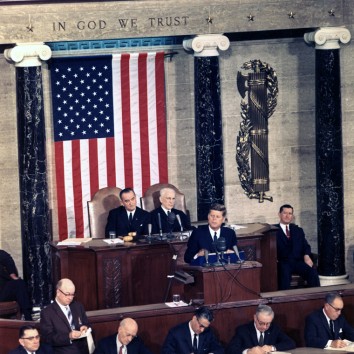Don’t Let Kennedy’s Vision for Deinstitutionalization Be Forgotten
 Fifty years ago this month, President John F. Kennedy told the nation in his State of the Union address that a change was needed in the way we treated the differently-abled.
Fifty years ago this month, President John F. Kennedy told the nation in his State of the Union address that a change was needed in the way we treated the differently-abled.
“I believe that the abandonment of the mentally ill and the mentally retarded to the grim mercy of custodial institutions too often inflicts on them and on their families a needless cruelty which this nation should not endure,” Kennedy said.
With that, he began a sweeping movement to close the institutions that had done such a disservice to the most vulnerable of our citizenry. Bills moved through the legislative process creating a new way for “typical” people to interact with the differently-abled, no longer hidden behind institutional walls.
Fifty years later, much has changed. It is now illegal to deny the developmentally disabled education. The health of the Down syndrome community has improved to the extant that life expectancy has gone from 20 to 60 years old and the differently-abled are participating in every phase of life from the schoolroom to the workplace.
Yes, much has changed, but there are still pockets of ignorance and cruelty. Last spring, The New York Times did a multi-story expose on the abuses still being suffered by the differently-abled in New York state. Among the findings, “the number of abuse accusations at large institutions overseen by the State Office for People With Developmental Disabilities outnumbered the beds in those facilities” in 2010.
The Times found “only 5 percent of abuse accusations were forwarded to law enforcement, and employees who physically or sexually abused the disabled were often transferred among group homes instead of being fired.” And while the New York governor’s office has taken steps to fix the injustices and The New York Times should be lauded for its investigative reporting, shame on all of us that this kind of horror is still possible in this country this recently.
A group of diners recently asked to be moved to another restaurant table away from a 5-year old with Down syndrome. But 50 years after Kennedy called for radical change, the server, a young man born well after Kennedy’s State of the Union, spoke up to those customers in defense of the boy and his family’s right to be in the restaurant. That story has bounced all over cyberspace and became a People “Hero” story.
Change is uneven and frustrating, but look around the classroom or community and you will see evidence of President Kennedy’s call to action on behalf of those of us who are defenseless.
Recent Posts
- GLOBAL LEADERS – An Exclusive Interview with Erin Suelmann, Executive Director of the Down Syndrome Association of Greater St. Louis
- Sleep Apnea Across the Lifespan in People with Down Syndrome
- Government Profiles: Robert Aderholt (R-AL) & Tammy Baldwin (D-WI)
- Connor Long & Josh Peck: A GLOBAL Bromance
- GLOBAL Launches Pilot Fitness Program using Mann Method PT

 Experience our inspirational and groundbreaking videos and photos. Our children and self-advocates are beautiful AND brilliant!
Experience our inspirational and groundbreaking videos and photos. Our children and self-advocates are beautiful AND brilliant! Make sure your local Representatives are on the Congressional Down Syndrome Task Force.
Make sure your local Representatives are on the Congressional Down Syndrome Task Force.